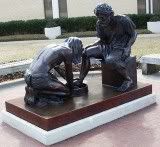WITHERINGTON ON THEODICY AND THE MINNEAPOLIS BRIDGE COLLAPSE
John Piper on his website of course recently had a post about the disastrous collapse of the bridge over the Mississippi in Minneapolis. His view was that however random it might seem to us, that actually this was the will of God, and in essence we should just suck it up. God is sovereign and he disposes things as he will, and according to his sovereign pre-ordained plan. If you just happened to be on the raw end of the deal, so much the worse for you. Since all have sinned and fallen short of the glory of God, actually God has a right to judge the whole world now, if he so chooses. The fact that he spared some shows God's mercy, according to Piper, but he was under no obligation to spare anyone. 'There but for the grace of God go I", so to speak. This doesn't sound much like an attempt to mourn with those who are mourning.
I wrote my masters thesis on Jonathan Edwards's theodicy, and I am certain that Piper follows Edwards down the line on this issue. So let's examine Witherington's critique and see if he has correctly understood Piper.
"God always does what is wise. And you and I know that God could have held up that bridge with one hand." Talitha said, “With his pinky.” “Yes,” I said, “with his pinky. Which means that God had a purpose for not holding up that bridge, knowing all that would happen, and he is infinitely wise in all that he wills."
[Piper's] view was that however random it might seem to us, that actually this was the will of God.
But unfortunately that appears to be where his understanding of Piper's view both starts and stops. Witherington proceeds to ask questions that clearly demonstrate a fundamental misunderstanding. He writes:
My question for them would--- is God the author of sin as well?
First, the question "Is God the author of sin?" is a bit loaded. Piper is in agreement with Edwards in answering this question. Edwards writes:
If by the author of sin, be meant the sinner, the agent, or the actor of sin, or the doer of a wicked thing; so it would be a reproach and blasphemy to suppose God to be the author of sin. In this sense, I utterly deny God to be the author of sin; rejecting such an imputation on the Most High, as what is infinitely to be abhorred; and deny any such thing to be the consequence of what I have laid down. But if, by the author of sin, is meant the permitter, or not a hinderer of sin, and, at the same time, a disposer of the state of events, in such a manner, for wise, holy, and most excellent ends and purposes, that sin, if it be permitted, or not hindered, will most certainly and infallibly follow;—I say, if this be all that is meant by being the author of sin, I do not deny that God is the author of sin, (though I dislike and reject the phrase, as that which by use and custom is apt to carry another sense), it is no reproach for the Most High to be thus the author of sin. This is not to be the actor of sin, but on the contrary, of holiness. What God doth herein is holy, and a glorious exercise of the infinite excellency of his nature (Freedom of the Will, vol. 1 of The Works of Jonathan Edwards [New Haven, CT: Yale University Press, 1957], p. 399).
So is God the author of sin? It depends on what you mean by that. If you mean, "Does God sin?" or "Does God tempt creatures to sin?" then Edwards's and Piper's answer is an emphatic no! God is NOT the author of sin. If, however you mean, "Does God foreordain (decide beforehand) whether sin should occur in his creation or not, so that it must then come to pass?" then yes! God IS the author of sin. The distinction is important. It is unfortunate that Witherington either isn't aware of it or failed to address it. As we will see, it makes all the difference.
Is God responsible for all that goes wrong in the world?
Again, Piper understands this issue in Edwardsian terms. If by "responsible" you mean "Is God culpable for wrongdoing?" then no. Of course, not. God is NOT responsible for all that goes wrong in the world. If, on the other hand, you mean "Is God the ultimate cause of wrongdoing?" then yes. God IS responsible for all that goes wrong in the world. Again, the distinction here is of utmost importance. Fundamentally it is a distinction based on the ideas Witherington addresses next. He asks:
Do these folks really have no clear sense of secondary causes which, while we can say God allows them to happen, we certainly would not want to say God causes or ordains them to happen? Is there no such thing in their vocabulary as God's permissive will? And even if there is-- what good is it for them to talk about God's permissive will, if in fact they think that God pre-ordains both what he permits as well as what he does directly?
(1) Inefficient cause- God; not culpable for evil.




No comments:
Post a Comment